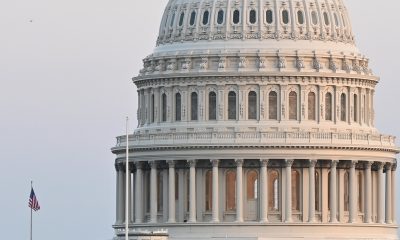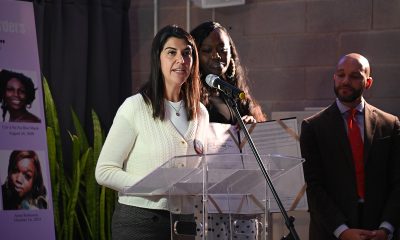Opinions
Rita Mae Brown ‘not interested’ in being gay
We need our LGBT writers to tell our stories


How can any of us queer scribes not be interested in being LGBT?
In 2008, I told my progressive, hetero cousin that I was a Lambda Literary Foundation Emerging Writer Fellow. It was an honor, but not the Nobel Prize, and I wasn’t expecting thunderous applause. I was surprised, though, when she asked, meaning no ill, “Do you want to be known as a gay writer?”
I was reminded of this when Rita Mae Brown, author of the landmark lesbian novel “Rubyfruit Jungle” (released in 1973), received the Pioneer Award on June 1 at the 27th Lambda Literary Awards in New York City. The award honors groundbreaking contributions to LGBT literature. Kudos to Brown! I can’t think of anyone more deserving of the honor. “Rubyfruit Jungle” was one of the first novels with a lesbian protagonist that was funny, at times poignant, but never dire.
More than four decades later, it’s hard to convey how exciting it was to read “Rubyfruit Jungle.” Its hero, Molly Bolt, is a lesbian who not only doesn’t die for being queer but, after fighting tough odds, makes a life for herself.
“While American heroes may occasionally be women, they may not be lesbian … if they are, they had better be discreet or at least miserable,” Shelly Temchin Henze wrote of “Rubyfruit Jungle” in New Boston Review. “Not Molly. She pursues sex with gusto.”
Her other work from her novel “Six of One” to her Mrs. Murphy mysteries has been beloved by generations. As Gloria Steinem said when she presented the Pioneer Award to Brown, laughter is “an orgasm of the mind.”
Given Brown’s LGBT literary legacy, I was surprised when Brown told the Washington Post after being asked why the Lammy Awards matter, “I really don’t know because I don’t think that way. I love language, I love literature, I love history, and I’m not even remotely interested in being gay.”
I, too, love language, literature and history. If I didn’t, I wouldn’t be a writer or a poet. Yet, as a lesbian, I can’t imagine not being “remotely interested” in being queer or in LGBT writers and literature.
Now, I don’t think about being queer 24/7, shout “I’m gay!” from the rooftops, or come out when I buy a quart of milk. When I’m crafting an essay, reporting a news story or making a poem, I’m writing for everyone, not just LGBT readers. Yet, especially, but not exclusively, in this Pride season, I’m proud to be a queer writer and for the LGBT perspective in my work. As long as homophobia and transphobia exist in this world, how can any of us queer scribes not be interested in being LGBT? Who can better witness and memorably write about this injustice better than LGBT essayists, poets, novelists, short story writers and poets?
As marriage equality progresses, and transgender rights slowly enter the mainstream’s radar screen, these trends will be reflected in our literature. While a hetero-normative perspective is welcome, I look forward to LGBT writers’ and poets’ takes on our weddings, divorces, parenting, and other rites of passage.
Despite the progress that’s been made, LGBT literary journals still “celebrate the juices, joys and jumps of our community,” Hiram Larew, a gay poet and author of the poetry collection “More Than Anything,” told the Blade. “The more we venture afield, the more we need the loving arms of our very own journals to welcome us back home.”
LGBT literature is good for the hetero as well as for the LGBT community, Clarinda Harriss, director of BrickHouse Books, told the Blade. BrickHouse, which published my poetry collection “The Uppity Blind Girl Poems” in 2015, has a Stonewall imprint. “The imprint was not created to do something for the LGBT community so much as to make use of what that community could do for us,” Harriss said.
Congrats to the Lammy winners and finalists! In this Pride season, let’s salute LGBT writers and literature.
Kathi Wolfe, a regular contributor to the Blade, was the winner of the 2014 Stonewall Chapbook Competition.
Opinions
Gay Treasury Secretary’s silence on LGBTQ issues shows he is scum
Scott Bessent is a betrayal to the community

We all know the felon in the White House is basically a POS. He is an evil, deranged, excuse for a man, out only for himself. But what is just as sad for me is the members of the LGBTQ community serving in his administration who are willing to stand by silently, while he screws the community in so many ways. The leader, with his silence on these issues, is the highest ranking “out” gay ever appointed to the Cabinet; the current secretary of transportation, the scum who goes by the name, Scott Bessent.
Bessent has an interesting background based on his Wikipedia page. He is from South Carolina and is what I would call obscenely wealthy. According to his financial assets disclosure to the U.S. Office of Government Ethics, Bessent’s net worth was at least $521 million as of Dec. 28, 2024; his actual net worth is speculated to be around $600 million. He married John Freeman, a former New York City prosecutor, in 2011. They have two children, born through surrogacy. I often wonder why guys like Bessent conveniently forget how much they owe to the activists in the LGBTQ community who fought for the right for them to marry and have those children. Two additional interesting points in the Wikipedia post are Bessent reportedly has a close friendship with Donald Trump’s brother Robert, whose ex-wife, Blaine Trump, is the godmother of his daughter. The other is disgraced member of the U.S. House of Representatives, John Jenrette, is his uncle.
Bessent has stood silent during all the administrations attacks on the LGBTQ community. What does he fear? This administration has kicked members of the trans community out of the military. Those who bravely risked their lives for our country. The administration’s policies attacking them has literally put their lives in danger. This administration supports removing books about the LGBTQ community from libraries, and at one point even removed information from the Pentagon website on the Enola Gay, the plane that dropped the first atomic bomb, thinking it might refer to a gay person. It was actually named after Enola Gay Tibbets, the mother of the pilot, Col. Paul Tibbets. That is how dumb they are. Bessent stood silent during WorldPride while countries around the world told their LGBTQ citizens to avoid coming to the United States, as it wouldn’t be safe for them, because of the felon’s policies.
Now the administration has desecrated the one national monument saluting the LGBTQ community, Stonewall, in New York City, by ordering the removal of the rainbow flag. The monument honors the people who get credit for beginning the fight for equality that now allows Bessent, and his husband and children, to live their lives to the fullest. That was before this administration he serves came into office. I hope his children will grow up understanding how disgusting their father’s lack of action was. That they learn the history of the LGBTQ community and understand the guts it took for a college student Zach Wahls, now running for the U.S. Senate from Iowa, to speak out for his “two moms” in the Iowa State Legislature in 2011, defending their right to marry.
Bessent is sadly representative of the slew of gays in the administration, all remaining silent on the attacks on the community. They are mostly members of the Log Cabin Republicans who have given up on their principles, if they ever had any, to be subservient to the felon, and the fascists around him, all for a job.
There are so many like them who supported the felon in the last election. Some who believed in Project 2025, others who didn’t bother to read it. Many continue to stand with him, with the sycophants in the Congress, and the incompetents and fascists in the administration, as they work to destroy our country and end the democracy that has served us so well for 250 years. To keep out all immigrants from a nation of immigrants. They all seem to forget it was immigrants who built our country, who fought against a king, and won. These sycophants now support the man who wants to be king. Who openly says, “I am president I can do anything only based on my own morality,” which history clearly shows us he has none.
I believe we will survive these horrendous times in American history. We have fought a king before and won. We have kept our country alive and thriving through a civil war. We the people will defeat the felon and his minions, along with the likes of those who stood by silently like Scott Bessent. They seem to forget “Silence = Death.”
Peter Rosenstein is a longtime LGBTQ rights and Democratic Party activist.
Opinions
Unconventional love: Or, fuck it, let’s choose each other again
On Valentine’s Day, the kind of connection worth celebrating

There’s a moment at the end of “Love Jones” — the greatest Black love movie of the 21st century — when Darius stands in the rain, stripped of bravado, stripped of pride, stripped of all the cleverness that once protected him.
“I want us to be together again,” he says. “For as long as we can be.”
Not forever. Not happily ever after. Just again. And for as long as we can. That line alone dismantles the fairy tale.
“Love Jones” earns its place in the canon not because it is flawless, but because it is honest. It gave us Black love without sanitizing it. Black intellect without pretension. Black romance without guarantees. It told the truth: that love between two whole people is often clumsy, ego-driven, tender, frustrating, intoxicating—and still worth choosing.
That same emotional truth lives at the end of “Eternal Sunshine of the Spotless Mind,” my favorite movie of all time. Joel and Clementine, having erased each other, accidentally fall back into love. When they finally listen to the tapes that reveal exactly how badly they hurt one another, Clementine does something radical: she tells the truth.
“I’m not perfect,” she says. “I’ll get bored. I’ll feel trapped. That’s what happens with me.”
She doesn’t ask Joel to deny reality. She invites him into it. Joel’s response isn’t poetic. It isn’t eloquent. It’s not even particularly brave. He shrugs.
“Ok.”
That “OK” is one of the most honest declarations of love ever written. Because it says: I hear you. I see the ending. I know the risk. And I’m choosing you anyway.
Both films are saying the same thing in different languages. Nina and Darius. Clementine and Joel. Artists and thinkers. Romantics who hurt each other not because they don’t care — but because they do. Deeply. Imperfectly. Humanly.
They argue. They retreat. They miscommunicate. They choose pride over vulnerability and distance over repair. Love doesn’t fail because they’re careless — it fails because love is not clean.
What makes “Love Jones” the greatest Black love movie of the 21st century is that it refuses to lie about this. It doesn’t sell permanence. It sells presence. It doesn’t promise destiny. It offers choice.
And at the end — just like “Eternal Sunshine” — the choice is made again, this time with eyes wide open.
When Nina asks, “How do we do this?” Darius doesn’t pretend to know.
“I don’t know.”
That’s the point.
Love isn’t a blueprint. It’s an agreement to walk forward without one.
I recently asked my partner if he believed in soul mates. He said no—without hesitation. When he asked me, I told him I believe you can have more than one soul mate, romantic or platonic. That a soul mate isn’t someone who saves you — it’s someone whose soul recognizes yours at a particular moment in time.
He paused. Then said, “OK. With those caveats, I believe.”
That felt like a Joel shrug. A grown one.
We’ve been sold a version of love that collapses under scrutiny. Fairy tales promised permanence without effort. Celebrity marriages promised aspiration without truth. And then reality — messy, public, human—stepped in. Will and Jada didn’t kill love for me. They clarified it.
No relationship is perfect. No love is untouched by disappointment. No bond survives without negotiation, humility, and repair. What matters isn’t whether love lasts forever. What matters is whether, when confronted with truth, you still say yes.
“Love Jones” ends in the rain. “Eternal Sunshine” ends in a hallway. No swelling orchestras. No guarantees. Just two people standing at the edge of uncertainty saying: Fuck it. I love you. Let’s do it again.
That’s not naïve love. That’s courageous love.
And on Valentine’s Day — of all days — that’s the kind worth celebrating.
Randal C. Smith is a Chicago-based attorney and writer focusing on labor and employment law, civil rights, and administrative governance.

The United States and the world are waiting for the Supreme Court to hand down its decisions in two cases (Little v. Hecox and West Virginia v. BPJ) that would rule on whether young trans women can play women’s sports at their schools. As trans journalist Erin Reed explained, these two cases are not just about transgender sports. These cases are litmus tests for trans rights at the nation’s highest courts and will have wide-reaching implications for the rights of trans and nonbinary people in the United States.
And these cases will impact cis women. As Orien Rummler reported for the 19th and them, anti-trans legislation and rulings threaten the rights of all women, especially cis women of color. The best example is the allegations that woman boxer Imane Khelif faced at the last Paris Olympics.
The gender policing that Khelif faced shows how sports bans that police who are considered a man or woman legitimize and mandate invasive medical testing, a form of medical abuse, against all women and girls who want to play sports. And let’s be clear — there is historical precedence for this.
The Nazi regime did use genetic screening in order to police who could have children as part of their “racial hygiene” programs, including marriage partner hereditary testing that flagged anyone with “tainted” genetic lineages. While prisoners in concentration and detention camps were subjected to horrifying medical experimentation, Nazi officials experimented with their own followers, facilitating reproduction only among people with desirable characteristics — notably those with blonde hair and blue eyes — and sterilizing those with undesirable genetics.
In fact, trans and gender non-conforming people were some of the first targeted by Nazi violence, with one of the first book burnings occurring in 1933 when Nazi youth and members of the Sturmabteilung ransacked the Institute for Sexual Science and burned one of the largest libraries of medical texts about gender affirming care. Nazi officials first exerted control over gender before extending this to race and religion.
And this was not confined to Nazi Germany. As I’ve written about before, the United States has used eugenics to justify the forced sterilization of women of color, disabled women, poor women, and incarcerated women. Forced sterilization was one part of forced or coerced medical testing that targeted Black and Indigenous women.
This medical violence, along with non-consensual experimentation including Dr. James Marion Sim’s gynecological experimentation on enslaved Black women, was rooted in systemic racism and medical abuse, and has contributed to legacies of mistrust and health disparities in medical institutions and practitioners.
When sports organizations, like the U.S. Olympic and Paralympic Committee, require women to undergo “sex verification,” they set a precedent of forced genetic testing that violates everyone’s privacy and could very well exclude many cis women from sports if they fall outside the bounds of what is defined as a “woman.”
The best example is cis women with Polycystic Ovary Syndrome. Some people with PCOS have hyperandrogenism, an excess of androgen, or experience hirsutism (i.e. the development of more traditionally masculine features like increased muscle mass and more pronounced facial hair.) Mandatory sex verification may diagnose or “out” women as intersex without their consent. Differences of Sex Development, another term used to describe intersex experiences, is more common than most people would expect.
Would women with PCOS not be considered women? What about women with more pronounced facial hair or greater muscle mass because of natural variation? It’s important to note what is considered American standards of womanhood are rooted in White supremacy — one of the reasons why women of color have been and will be targeted by anti-trans violence.
The very people making these decisions are also beginning to ask these questions. According to Erin in the Morning, Supreme Court Justice Amy Coney Barrett is even worried about the implications of these two Supreme Court decisions. As Alejandra Carabello, a Harvard Law educator, told Erin in the Morning, a decision supporting anti-trans sports bans “could result in the segregation of women in a host of other areas of public life under the rationale that biologically, men are different and they need to be segregated.”
Barrett, a conservative justice who was appointed by Trump in 2020, seems to acknowledge these risks, saying “your whole position in this case depends on there being inherent differences.”
There is not. According to science, gender is not a strict binary but a spectrum determined by biological, psychological, and social factors, including cultural norms surrounding gender.
The best indication of this is that intersex people exist. Intersex people are individuals born with sex hormones and characteristics that differ from a strict male to female binary. Some people are born with atypical genitalia, specifically external genitals that don’t look male or female or are underdeveloped. Some are born with phallia, a condition where a baby is born without a penis, some born with a “mismatch” between their internal and external organs.
In all of these cases, the idea of normal, mismatched and properly developed genitalia and bodily presentation is conditional upon a male and female binary reinforced by the medical establishment — and to be clear, this gender binary has hurt people. For decades, intersex babies have suffered medical abuse because doctors perform unnecessary surgeries to “fit” these children into a female/male binary. These medically nonessential surgeries performed on children who cannot consent are a form of medical assault.
To be clear, this is not the same as gender affirming care performed on consenting individuals who are receiving hormone therapy and surgery to align their gender presentation with their identity. As major medical and mental health organizers assert, gender-affirming care is medically necessary and lifesaving healthcare for trans and nonbinary people.
And the vast majority of children who are having gender affirming surgery are cis ones. A June 2024 study found that the vast majority of minors undergoing gender-affirming surgeries were cis children. This did not include intersex people who underwent surgery or people who received surgery for an illness or injury. About 97 percent of 150 cases where minors received gender affirming surgery in 2019 were chest reduction surgery performed on cis boys. This surgery is commonly performed on boys with gynecomastia, or develop enlarged breasts due to a hormone imbalance.
So for many, the decisions expected on these Supreme Court cases may seem confined to sports but in actuality, they have profound ramifications not only for cis women but also amid the growing escalation and legitimization of eugenics in the United States.
It’s no mistake that earlier this month, Dr. Elisa von Joeden-Forgey, president of the Lemkin Institute, stated that the U.S. is in the “early-to-mid stages of a genocidal process against trans and nonbinary and intersex people.” Dr. Gregory Santon, former president of the International Association of Genocide Scholars, flags “a hardening of categories” surrounding gender in a “totalitarian” way.
Stanton argues that this is rooted in Nazi ideology’s surrounding gender — this same regime that killed many LGBTQIA individuals in the name of a natural “binary.” As Von Joeden-Forgey said, the queer community, alongside other “minority groups, tends to be a kind of canary in the coal mine.”
Even the fact that discussions of the trans sports ban foreground its potential implications for cis women (or that this is the primary concern voiced by Barrett) showcases whose bodies take priority.
This framework reflects how members of the feminist movement have used and presently do use the movement to justify the very anti-trans exclusion that will harm them. Some call themselves trans-exclusionary radical feminists (TERFs); these women believe that codifying and protecting trans women’s rights threatens the rights of cis women and have even partnered with some conservative groups because of their commitment to enforce what it means to be a “biological woman.”
As history can show us, it’s exactly the opposite — first, feminism is rooted in equity for all people, all women, not just cis women. Because protecting trans women from medical violence like sex verification testing and challenging people and organizations that police who a woman is, protects all women.
Emma Cieslik is a museum worker and public historian.




















